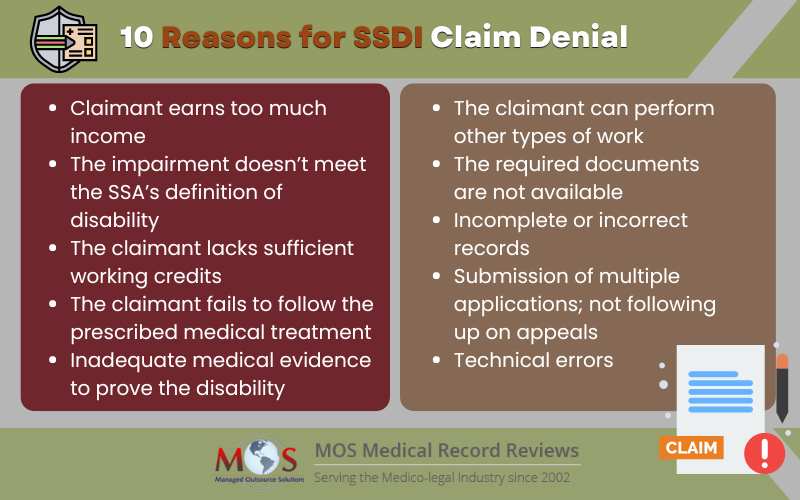The SSDI (Social Security Disability Insurance) Program benefits Americans with severe and ongoing disabilities, provided they qualify for the benefits. Determination of eligibility involves medical records review to find out if the impairment merits disability payment. A claim submitted must conform to all of the rules, and all the required information must be provided in the right format to speed up the application process. It is significant to note that at least one-third of disability applications are denied by the SSA. Attorneys handling disability cases can benefit from performing a detailed review of their clients’ medical records to determine whether the claim is a valid one.
MOS Medical Record Reviews provides dedicated medical chart review services for disability lawyers.
Ask us for a Free Trial!
Call 1-800-670-2809
Though the number of claims have increased, there is an increase in the number of denials as well. There are specific reasons why disability claims are denied. So, here are some of those to consider when applying for disability benefits.
Major Reasons for Social Security Disability Claim Denial
- The applicant earns too much income: The SSA reviews the applicant’s monthly earnings when they apply. For the year 2024, a claimant can apply for SSDI only if his/her monthly earnings is $1,550 per month in 2024. For the blind, this amount is $2,590 per month.
- The applicant’s condition does not meet the SSA’s definition of disability: To be eligible to receive disability income, the particular impairment must have lasted or will last at least 12 months, or must be serious enough that it is expected to result in the death of the claimant. The particular condition must also be on the social security administration’s listing of impairments. If the candidate has not received any treatment or if the SSA requires more information, he/she may have to undergo a special examination at the SSA’s expense.
- The applicant does not have sufficient working credits: To qualify, the applicant must have put in sufficient years of work in the past. The credits are calculated on the basis of age, the number of years of service, and when the disability struck. A person who became disabled before age 28 will have to put in 1.5 years of work before to be eligible. There is a better chance of the claim being approved if the applicant is older and has worked in recent years.
- The claimant doesn’t follow the prescribed course of medical treatment: This is another reason for claim denial. Claimants need to follow the prescribed medical treatment for their disability. Many claimants do not do so, which is a mistake because the disability could become worse if not properly treated. With proper treatment, the disability could disappear as well.
- Inadequate medical evidence: If the disability application lacks sufficient medical evidence, the SSA may disagree that the claimant meets its disability criteria. The medical records must not only show the existence of a disability, but also that this condition has interfered with the claimant’s ability to work. The SSA will not accept medical records that do not show a clear diagnosis, are incomplete, or do not have any physician’s notes regarding how the condition has limited the claimant’s ability to work.
- The SSA determines that the applicant is fit to do another related job: There is every chance that an application will be rejected if the applicant is fit enough to do another job. This is evaluated with the help of an examiner. However, the applicant can, with the help of a disability lawyer, prove how the particular disability leaves him/her with no options; that the severity of the impairment prevents them from doing any kind of work-related activities.
- The required documents are not available: In this instance also, claims are likely to be denied. Required documents include income records, work history records, medical records, and applications for other disability benefits and so on.
- Incomplete or incorrect records: The medical records relevant to the case may have to be obtained from various sources including doctors, hospitals, and other healthcare providers. These need to be organized, reviewed and should offer a complete picture of the particular disability so that the SSA can process the claim smoothly and efficiently.
- Submission of multiple applications and failure to pursue the appeal process: Sometimes, claimants submit a fresh application instead of appealing a claim denial. If the SSA finds that the claimant was denied benefits earlier based on a similar application, he/she may have to face claim denial again.
- Technical errors: These include not submitting the original documents when they are needed, or not including the Social Security number and such other mistakes.
Once the application is made, it may take some time for processing the same depending on the amount of verification, follow-up and additional exams that may be necessary. In case the disability application is denied, the claimant can appeal the decision with the help of a social security disability lawyer.
Don’t let voluminous medical record review take up your valuable time. We can review large-volume medical records within your required turnaround time.





